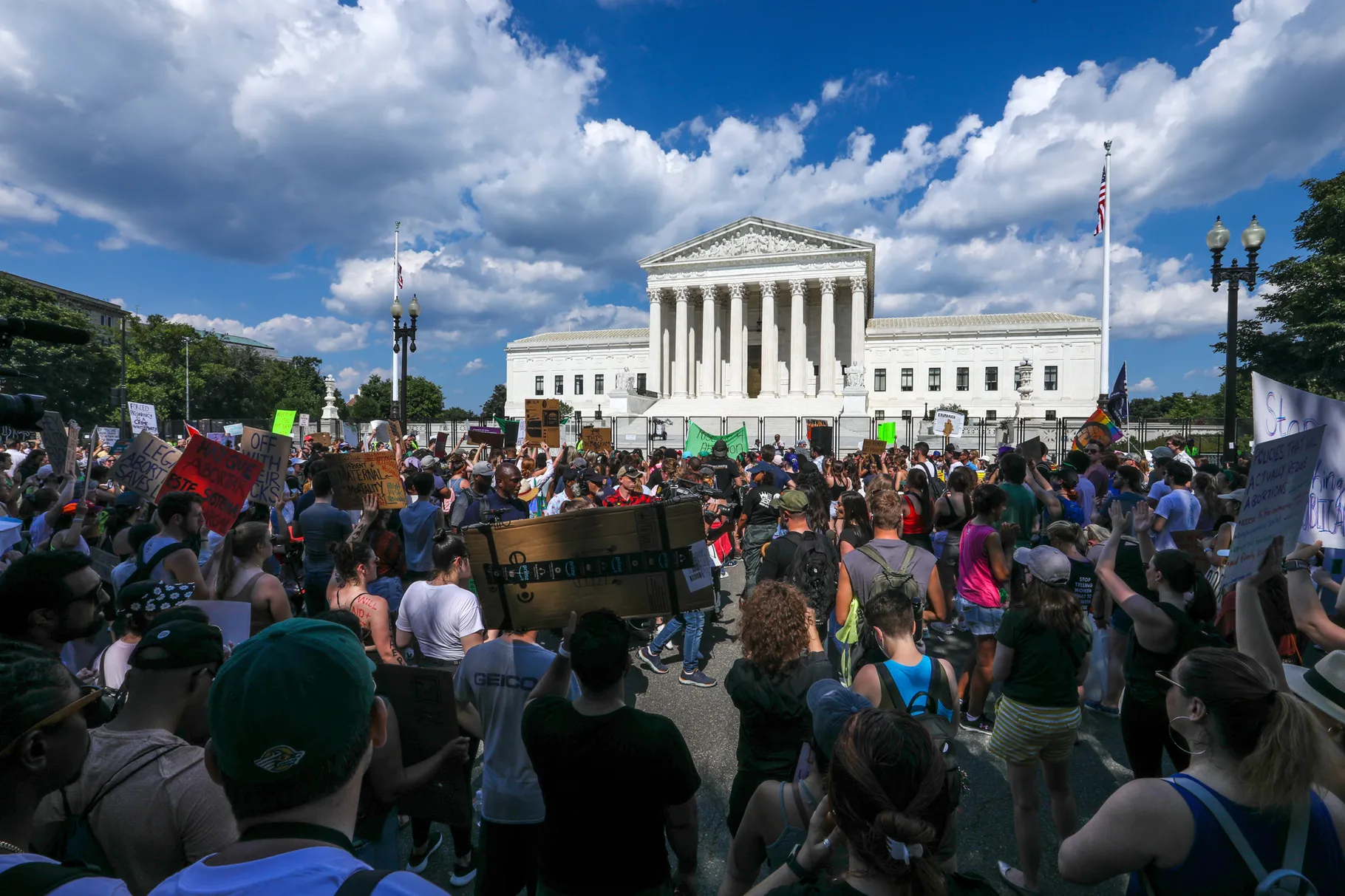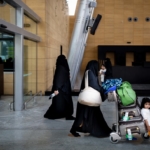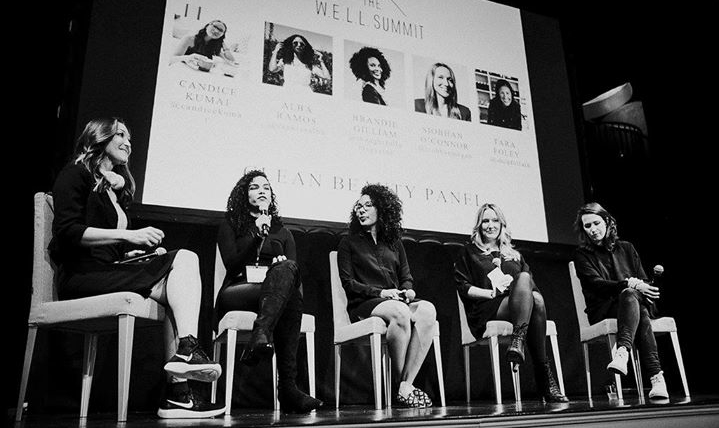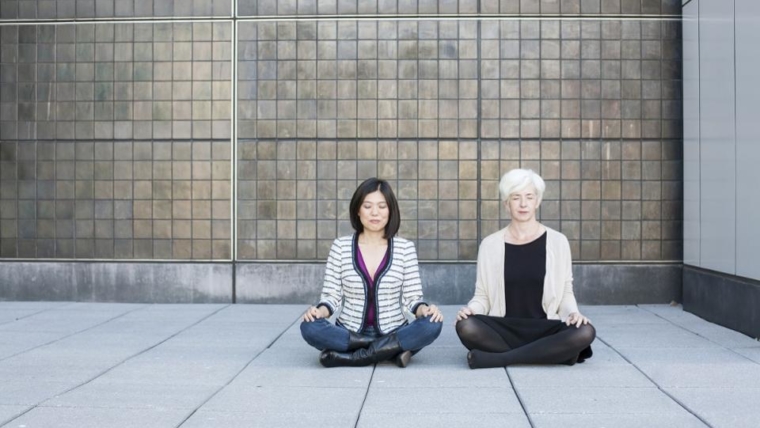
Cities and towns across the US have seen sustained protests since Dobbs was handed down.
Pro-choice activists and reproductive rights supporters have been making their voices heard through mass protests in response to the Supreme Court’s Friday decision on Dobbs v. Jackson Women’s Health Organization, which effectively overturned 1973’s Roe v. Wade ruling that gave Americans a constitutional right to an abortion.
“It’s a betrayal against women,” Natasha Mitchell of Denver told CNN during an abortion rights protest in Colorado, a state that recently codified abortion rights into law. “I’m fortunate that I live in a state that respects the reproductive rights of women but I fear for women who don’t.”
The area around the Supreme Court building in Washington, DC, has been packed with throngs of protesters — as well as much smaller counterprotests — since the Supreme Court’s decision. Demonstrators supporting reproductive rights have also come out in force across the country in states like New York, Missouri, North Carolina, Oklahoma, and Michigan.
:no_upscale()/cdn.vox-cdn.com/uploads/chorus_asset/file/23652654/1241534397.jpg)
:no_upscale()/cdn.vox-cdn.com/uploads/chorus_asset/file/23652668/1241530061.jpg)
:no_upscale()/cdn.vox-cdn.com/uploads/chorus_asset/file/23652677/1241531691.jpg)
:no_upscale()/cdn.vox-cdn.com/uploads/chorus_asset/file/23652632/1241531649.jpg)
Lawmakers also joined the protesters. Rep. Alexandria Ocasio-Cortez (D-NY) appeared alongside abortion rights advocates at New York City’s Union Square protest on Friday. Ocasio-Cortez shared her own experience of sexual assault and called on President Joe Biden to create abortion clinics on federal land.
“I think one of the things that we know, too, is that there are also actions at President Biden’s disposal that he can mobilize,” Ocasio-Cortez told the crowd. “I’ll start with the babiest of the babiest of the baby steps: open abortion clinics on federal lands in red states right now.”
By Friday night, protests began to intensify in some areas, with much of the aggression tied to law enforcement response. In Arizona, law enforcement officials were captured on video deploying tear gas to clear out an estimated 7,000 protesters gathered outside the state Capitol in Phoenix. A police officer running for the state senate in Rhode Island was charged with assault after allegedly punching his campaign opponent at an abortion rights rally near the statehouse (the officer alleged that his opponent had become physical with him during the protest; she denied the allegation).
One woman in Iowa was also hospitalized after a man drove his truck toward a procession of abortion rights protesters crossing the street in downtown Cedar Rapids, Iowa. Several eyewitnesses said the driver became “impatient” and began maneuvering around other cars before driving into protesters; the incident is now the subject of an investigation by local authorities.
“I had to literally come down here today because I have nowhere to put my emotion, my fear, my anger, and my sorrow,” Jennifer Jonassen told the Los Angeles Times as she joined protesters in front of LA’s City Hall for the city’s second day of protests on Saturday.
:no_upscale()/cdn.vox-cdn.com/uploads/chorus_asset/file/23652658/1241532971.jpg)
:no_upscale()/cdn.vox-cdn.com/uploads/chorus_asset/file/23652652/1241536202.jpg)
:no_upscale()/cdn.vox-cdn.com/uploads/chorus_asset/file/23652656/1241538255.jpg)
:no_upscale()/cdn.vox-cdn.com/uploads/chorus_asset/file/23652635/1405152514.jpg)
On Saturday, the crowds in front of the Supreme Court had not relented, as thousands of abortion rights supporters continued to chant and wave signs around the building’s security parameter.
“I can’t believe that is what God intended, not the God that I serve,” Mary Tretola-Johnson told the Washington Post. “All I could think was ‘Not in America.’ It was overwhelming.”
Protests continued in cities like Columbus, Ohio, and Green Bay, Wisconsin on Sunday. In New York City, Sunday’s Pride Parade was kicked off by a group of marchers representing Planned Parenthood, who were cheered by onlookers.
Anti-abortion activists also rallied in the 48 hours since the court’s decision as they celebrated the fall of Roe v. Wade. Randall Terry, founder of the militant anti-abortion group Operation Rescue, likened its Dobbs ruling to the Allied forces’ Normandy invasion. Terry was one of a handful of counterprotesters outside the Supreme Court.
Since the announcement of the Supreme Court’s decision, at least eight states have already enacted near-total abortion legislation through special statutes known as “trigger laws,” essentially statutes that restrict abortion access which were activated, or “triggered,” at the moment Roe was overturned. More states — primarily those with Republican-controlled legislatures — are expected to soon expand abortion restrictions.
:no_upscale()/cdn.vox-cdn.com/uploads/chorus_asset/file/23652727/1405088991.jpg)
:no_upscale()/cdn.vox-cdn.com/uploads/chorus_asset/file/23652728/1241543306.jpg)
:no_upscale()/cdn.vox-cdn.com/uploads/chorus_asset/file/23652732/1241517605.jpg)
But it’s not only rights to abortion access that are under siege. Reproductive rights advocates and educators fear the next potential targets for right-wing politicians and activists may include access to contraception, assisted reproduction like IVF treatment, and even broader health care restrictions. Part of their concern stems from a concurrent Dobbs opinion written by Justice Clarence Thomas that claims the cases establishing a right to gay marriage and access to birth control were decided on shaky legal reasoning, and that the Court has “a duty to ‘correct the error.’”
On Sunday, South Dakota Gov. Kristi Noem, whose state was among several trigger law states, told CBS’s Face the Nation that South Dakota would enforce its ban on telemedicine abortions, which would prevent access to abortion medication prescribed online. US Attorney General Merrick Garland has previously stated the Department of Justice would protect both a person’s right to abortion and their access to abortion pills. That means a legal challenge to medication access, one that could have national ramifications, may be imminent.
Julia Feldman-DeCoudreaux, an Oakland-based school sex educator, told Vox that access to quality sex education could also suffer even more now, leaving young people vulnerable. “If that happens,” she said, “We’re going to have a catastrophic situation.”
Though the fall of Roe has been a crushing blow for abortion rights supporters, the weekend’s protests are a clear signal that many across the country have also found renewed strength to keep rallying for reproductive rights.
“We have to be proactive,” said Lura Van Sweden during an abortion rally at Michigan’s Capitol. Van Sweden, who marched for women’s rights in the 1960s, vowed to continue the fight. “Don’t quit. That’s what they want, for us to give up. I won’t give up.”
Image: Yasin Ozturk/Anadolu Agency via Getty Images







